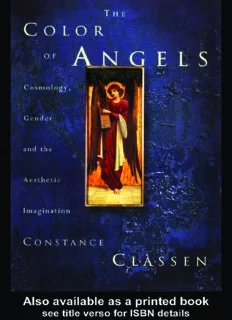
The Color of Angels: Cosmology, Gender and the Aesthetic Imagination PDF
Preview The Color of Angels: Cosmology, Gender and the Aesthetic Imagination
The Color of Angels The Color of Angels explores the rich symbolism of the senses in Western culture through the ages. In the process, Constance Classen uncovers the gender politics behind such cultural constructs as the male gaze and the female touch and traces the development of an aesthetics of the senses from medieval cosmology to modern art. The book is divided into three parts cosmology, gender and aesthetics and explores topics ranging from the sensuous visions of St Hildegard of Bingen to the gender codes of Renaissance literature and the machine aesthetics of Futurism. The Color of Angels compellingly demonstrates the relationship between sensory and gender orders, revealing a crucial but previously unexplored area of womens history. Beautifully written, the book will appeal to students from a variety of disciplines, including gender studies, cultural studies and art. Constance Classen is a cultural historian whose previous publications include Worlds of Sense: Exploring the Senses in History and Across Cultures and Aroma: The Cultural History of Smell (with David Howes and Anthony Synnott). The Color of Angels Cosmology, gender and the aesthetic imagination Constance Classen London and New York First published 1998 by Routledge 11 New Fetter Lane, London EC4P 4EE Simultaneously published in the USA and Canada by Routledge 29 West 35th Street, New York, NY 10001 This edition published in the Taylor & Francis e-Library, 2006. “To purchase your own copy of this or any of Taylor & Francis or Routledge’s collection of thousands of eBooks please go to www.eBookstore.tandf.co.uk.” © 1998 Constance Classen All rights reserved. No part of this book may be reprinted or reproduced or utilized in any form or by any electronic, mechanical, or other means, now known or hereafter invented, including photocopying and recording, or in any information storage or retrieval system, without permission in writing from the publishers. British Library Cataloguing in Publication Data A catalogue record for this book is available from the British Library Library of Congress Cataloging in Publication Data Classen, Constance, 1957— The color of angels : cosmology, gender, and the aesthetic imagination / Constance Classen. p. cm. Includes bibliographical references and index. 1. Senses and sensation-Sex differences-History. 2. Senses and sensation Religious aspects Christianity-History. 3. Senses and sensation in art-History. I. Title. BF233. C56 1999 152.1’ 09-dc21 9821837 CIP ISBN 0-203-00759-X Master e-book ISBN ISBN 0-203-15868-7 (Adobe eReader Format) ISBN 0-415-18073-2 (hbk) ISBN 0-415-18074-0 (pbk) For Jonathan Gabriel Contents Illustrations viii Acknowledgements ix Introduction 1 PART I Cosmology 11 1 On the color of angels: the sensory cosmologies of St. Hildegard, Boehme, and Fourier 13 2 The breath of God: sacred histories of scent 36 PART II Gender 61 3 The scented womb and the seminal eye: embodying gender codes through the senses 63 4 Pens and needles: writing, women’s work, and feminine sensibilities 86 PART III Aesthetics 107 5 Symbolist harmonies, Futurist colors, Surrealist recipes: crossing sensory borders in the arts 109 6 A feel for the world: lessons in aesthetics from the blind 138 Notes 161 Bibliography 209 Index 229 Illustrations 1 Hildegard of Bingen, “The Choirs of Angels” from Scivias (New York, The Paulist Press, 1990) 12 2 Georg Pencz, Tactus and Gustus, from the collection of Den Kongelige Kobberstikssamling (Statens Museum for Kunst, Copenhagen, Denmark) 62 3 Remedios Varo, Still Life Reviving, 1963 (courtesy of Walter Gruen) 108 4 Margaret Macdonald, The Sleeper, c. 1901 (© Hunterian Art Gallery, University of Glasgow) 123 5 Remedios Varo, Embroidering Earth’s Mantle, 1961 (courtesy of Walter Gruen) 134 6 “The Blind-Deaf Ludivine Lachance,” from Corinne Rochelau, Hors de sa prison (Montreal, Arbour and Dupont, 1927) 146 Acknowledgements My thanks to the people who have supported my work over the years, including Gregory Baum, Anthony Synnott, Michael Herzfeld, Steven Feld, Roy Porter, Chris Rojek, Mike Featherstone, Londa Schiebinger, Michael Jackson, Lawrence Sullivan, Thomas McIntire, Jim Drobnick, Jennifer Fisher, Susan Ashbrook Harvey, Mari Shullaw and Janice Helland. David Howes has been a continual source of encouragement and advice, for which I am deeply grateful. My thanks also go to George Classen who has tirelessly and skillfully assisted me in preparing my manuscripts for publication. Part of the research for this book was undertaken while I was a Fellow at the Center for the Study of World Religions at Harvard University and a Research Reader at the Centre for the Study of Religion at the University of Toronto. My work has been supported by grants from the Social Sciences and Humanities Research Council of Canada and the Fonds pour la Formation de Chercheurs et l’Aide à la Recherche. An earlier version of Chapter 3 was published as “Engendering Perception: Gender Ideologies and Sensory Hierarchies in Western History,” Body & Society 3: 2 (1997), pp. 1–19. The author and publisher wish to thank the copyright holders for their kind permission to reproduce visual images in this book. Every effort has been made to obtain permission to reproduce copyright material. If any proper acknowledgement has not been made, we would invite copyright holders to inform us of the oversight.
Description: